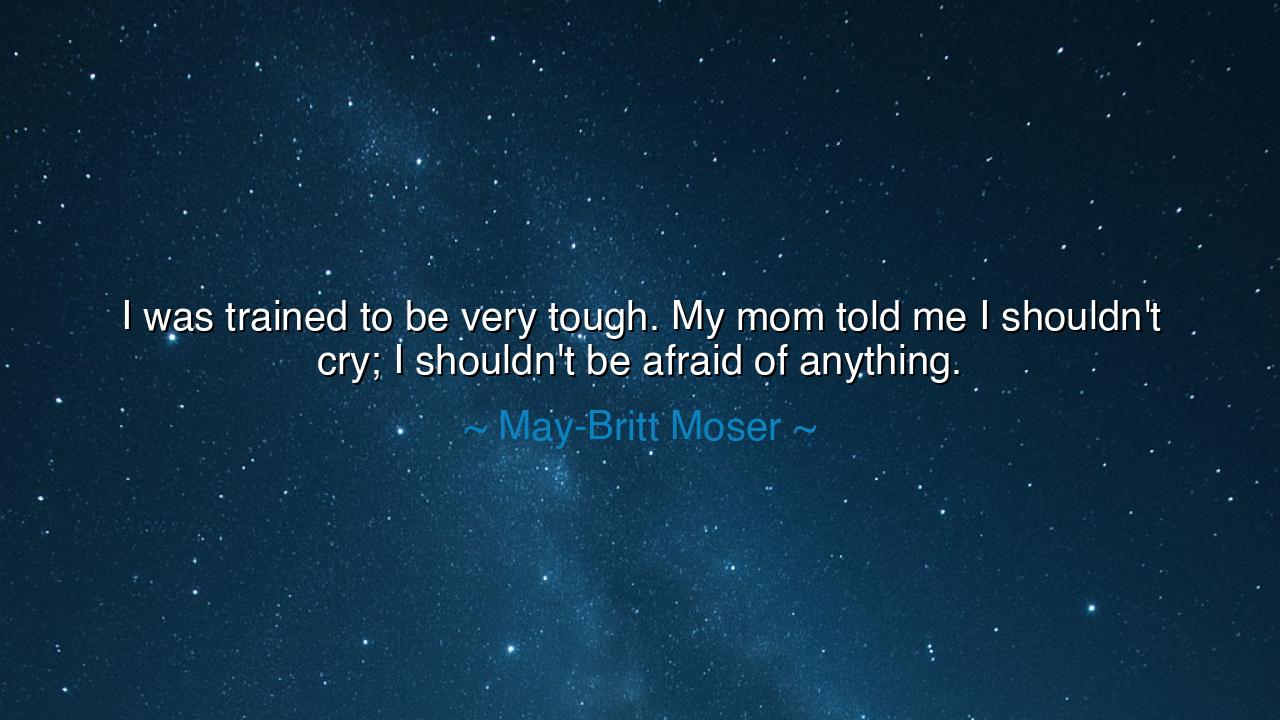
I was trained to be very tough. My mom told me I shouldn't cry; I
I was trained to be very tough. My mom told me I shouldn't cry; I shouldn't be afraid of anything.






“I was trained to be very tough. My mom told me I shouldn’t cry; I shouldn’t be afraid of anything.” — May-Britt Moser
In this resolute and stirring declaration, May-Britt Moser, the Nobel Prize-winning neuroscientist, opens a window into the forge of her character — a childhood shaped not by indulgence, but by discipline and strength. Her words, “I was trained to be very tough,” speak of a kind of upbringing both ancient and timeless: the forging of a soul in the fire of resilience. Behind her calm tone stands the figure of her mother, a teacher of steel and tenderness, who knew that life would test her daughter’s spirit, and who therefore armored her in courage. “You shouldn’t cry; you shouldn’t be afraid of anything,” she said — not to erase her child’s heart, but to make it unbreakable.
The ancients would have understood this perfectly. For every civilization that ever rose from dust and stone taught its children that strength is not cruelty, and courage is not the absence of feeling — but the mastery of it. The Spartans raised their sons and daughters alike to face hardship without fear, believing that endurance was the foundation of virtue. The Stoics, too, from Epictetus to Marcus Aurelius, taught that the soul must stand firm against the storms of fate. Moser’s mother, in her own modern way, was passing down the same ancient wisdom: that tears may flow, but they must not drown; that fear may whisper, but it must not rule.
And yet, within these words lies not hardness but love — the fierce, protective love of a mother who knows the cruelty of the world and refuses to let it break her child. The ancients revered such women: Thetis, who dipped Achilles in the river to make him immortal, though she could not save his heel; Cornelia, the Roman matron who called her children her “jewels,” and raised them to lead and to serve; or Queen Olympias, who prepared her son Alexander to rule not with fear, but with fire. Each of these women, like Moser’s mother, carried within her the paradox of motherhood — to nurture tenderness, yet prepare the soul for battle.
May-Britt Moser herself would grow to embody this dual inheritance: the scientist of the mind who also understood the heart. To win a Nobel Prize in neuroscience is not merely an intellectual triumph; it is the fruit of perseverance, of years spent confronting failure, skepticism, and the loneliness of discovery. In the crucible of scientific pursuit — a realm where doubt can crush the weak — her mother’s lessons became her armor. To not cry when the experiment fails. To not fear when others doubt you. To stand firm, knowing that truth, like light, rewards only those who refuse to turn away from the darkness.
But this quote also carries a deeper, more universal resonance — the eternal struggle between vulnerability and strength. The ancients taught that to be human is to walk the narrow path between the two. The mother who says, “Don’t cry,” does not forbid emotion; she teaches control. For tears have their place — in love, in loss, in beauty — but not in surrender. Courage is not the silence of the heart, but its discipline. In every era, those who achieve greatness are those who learn this balance: to feel deeply, yet act firmly; to be moved by compassion, yet unmoved by fear.
Consider Joan of Arc, the peasant girl who, at seventeen, led armies and faced death with unshaken faith. No doubt she knew fear. But she had been trained, by faith and fire, not to let that fear define her. When she was captured and sentenced, she did not weep before her judges. She stood proud, as though her spirit had already risen beyond them. Like Moser’s mother, she understood: tears may be human, but courage is divine. The strength to act in the face of terror — that is the measure of greatness.
Let this teaching, then, be passed on as wisdom for all generations: Do not fear the trials that temper you, for they are the tools of your becoming. The world will not spare you pain, and it will not wait for your readiness. Train yourself, as Moser was trained — to endure, to rise, to persevere. Parents, teach your children not only gentleness, but grit; not only kindness, but courage. For a soul untested cannot grow, and a heart that flees from fear cannot lead.
And so, as the ancients would say: Fortitude is the mother of wisdom, and discipline the mother of freedom. When life demands strength, do not shrink; when the world trembles, stand tall. Cry, if you must — but let your tears be of gratitude, not defeat. For those who are taught, as May-Britt Moser was taught, to fear nothing and endure everything, become not only survivors of the world — but its illuminators.






AAdministratorAdministrator
Welcome, honored guests. Please leave a comment, we will respond soon